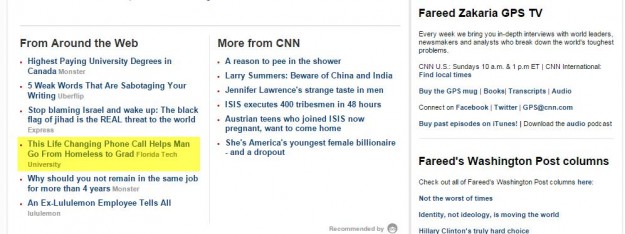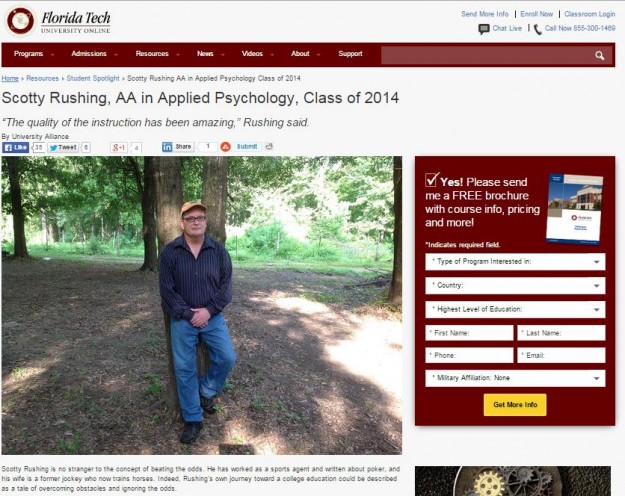
A content discovery tool is a digital advertising platform that allows you to embed a link to your content inside other, high visibility content. Leading companies providing this emerging advertising model include Tabola, Outbrain, and NRelate. These native advertising platforms place a link to the advertiser’s content within related content published by a large digital media publisher, for example, CNN, Fox News, MSNBC, USA Today, Slate.com, Inc.com, Time, Mashable or the Weather Channel. The list of publishers that accept this type of advertising is growing rapidly as media publishers embrace and adopt this new business model of advertising.
A Higher Ed Example
A recent search on the term “higher education” on the CNN.com website provided a number of links, including one to the following story about free university tuition for students in Germany.

At the bottom of that story, there appears a section, as seen below, that includes links to other related stories “From Around The Web”. (Please note that these links are regularly refreshed and updated and the same link may not appear in your search.)

This list of related stories includes a paid link to the advertiser, Florida Technical University, entitled “This Life Changing Phone Call Helps Man…” that links to the following page on their website.
This hybrid content/landing page delivers on the promise of content related to “higher ed”, providing a compelling student success story alongside a well-crafted lead generation form. Traffic to this page can then be analyzed in Google Analytics to determine the volume of traffic coming from the link on the CNN page, leads and registrations tracked to this source and ultimately the ROI for the campaign.
So How Do You Manage A Content Discovery Campaign?
Leading inbound marketing company Hubspot recommends the following approach:
- Determine a goal for the campaign
Is your campaign a branding campaign, where you would be satisfied with a lift in traffic to your page/college website or is it intended as a direct response effort, where you have a higher expectation of a specific number of prospective student leads or inquiries generated. Set a goal for the campaign and then build it out to realize the specific goal. - Determine the content that you will promote
To realize your campaign goal you might determine to use existing content, i.e. an existing student success story, major new graduate program announcement or create brand new content specifically developed to meet the objectives of the campaign. - Optimize the content
Depending on your goals, you’ll want to finesse the content, possibly the length, the tone, etc. If you have a direct response goal, the Call to Action is critical, along with the design of any form you use. Keep in mind that the searcher is very high in the lead generation funnel and that asking for a minimum of information from them will yield the highest conversion results. - Upload your content and run the campaign
As you may have noted in the example above, the CNN link copy is different than the heading of the actual web page. Some content discovery systems will allow you to A/B test your link copy for best effect. - Analyze your results
Your content discovery systems will provide the data you need on traffic and conversions to manage your campaign and determine ROI.
I am just beginning to experiment with content discovery so I can’t yet provide any major insights into how effective they are in college and university recruitment marketing. I am hoping some of you who have run these types of campaigns can jump in here to provide a bit of feedback from your experiences that we can all learn from. Here’s a Quora Q&A that does shed a bit of light on how some of these tools compare.
Would you say content discovery is likely more effective for general branding effect, or is successful lead generation a reasonable expectation of this new model of advertising?
HEM is a Hubspot certified partner.







